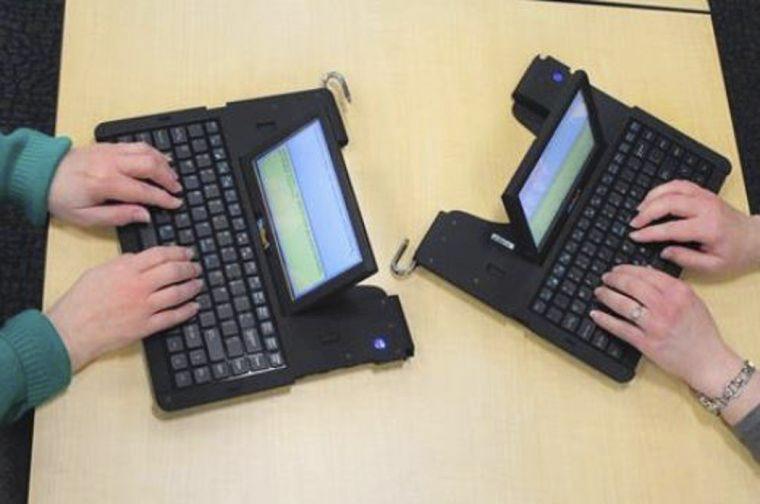
The Columbia Police Department was given a new device to help work with people with hearing disabilities.
The device was donated to CPD by the Columbia Police Foundation on Oct. 6. The UbiDuo is wireless and has two screens and keyboards, which essentially provides an instant message chat, CPD Public Information Officer Bryana Larimer said.
“They’re having face-to-face contact, and they’re having a conversation going back and forth,” Larimer said. “Those conversations also can now be saved and printed out and attached to a police report.”
Police officers used to use a pencil and notepad in order to communicate with the hearing impaired, and “that’s not as organized as using the UbiDuo,” Larimer said. However, she said the UbiDuo does not replace the need for sign language communication.
Some deaf individuals may not feel comfortable using the UbiDuo because of their lack of proficiency in the English language, MU Deaf Services Coordinator Angela Branson said.
“You can almost think of English as a (born signer’s) second language,” Branson said. “So they might not be as comfortable using the UbiDuo and conversing in English. And so in that case, it may just be helpful for (the born signer) to ask for an interpreter through the UbiDuo, and then bring a sign language interpreter in.”
Although CPD does not employ interpreters, it is able to bring in outside resources, including available interpreters, Larimer said. The MU Police Department does not have their own UbiDuo; however, MUPD works with the hearing impaired to determine their needs, Maj. Brian Weimer said.
“Often times we use written communication but can access services available by the university,” Weimer said in an email.
Any employee from MUPD is able to communicate with hearing-impaired individuals. Although MUPD has not given any specific training to their officers on how to interact with the hearing impaired, MUPD has not had any issues in the area, Weimer said.
Branson used to work for a state agency called the Missouri Commission for the Deaf and Hard of Hearing. MCDHH is located in Jefferson City, and Branson said it works for the interests of the deaf and hard of hearing people across the state. MCDHH used to team with the Missouri Deputy Sheriffs Association and conduct a training event called, “Officer, I Can’t Hear You!”
Branson said MCDHH would do workshops all across the state training first responders and 911 operators on how to identify a deaf or hard of hearing individual and how to work and communicate with them.
Moreover, MCDHH Information Program Specialist Emily Fry started working at MCDHH this last July, and one of her first projects was to go through the “Officer, I Can’t Hear You!” materials and update them Fry said in an email.
“(The materials) were originally created several years ago, and technology and terminology have changed a lot since then.” Fry said in an email. MCDHH has not yet released this new training, however, MCDHH has signed a memorandum of understanding with the Missouri Sheriffs’ Association that emphasizes training for sheriffs on the best ways to interact with deaf or hard of hearing citizens Fry said in an email.
MCDHH also has training on the Missouri Visor Card program, which is a program that provides Missourians with hearing loss with a visor card if applied for when they fill out MCDHH’s Deaf Census Fry said in an email.
“The card can be used to show the officer that the driver has a hearing loss, and the symbols on the card can be used to facilitate basic communication during a traffic stop.” Fry said in an email.
Although Branson said the UbiDuo is a good step, she doesn’t think it is the answer for everyone. Branson said “you just have to kind of be aware” to ensure the safety of the hearing impaired, which means being well-educated on the hearing impaired and what they need to communicate more efficiently with officers.
“I think that currently in the news, you hear a lot about police, you know?” Branson said. “About how they need to reach out to different groups and individuals, and I think that disabled individuals sometimes get overlooked in all of that.”